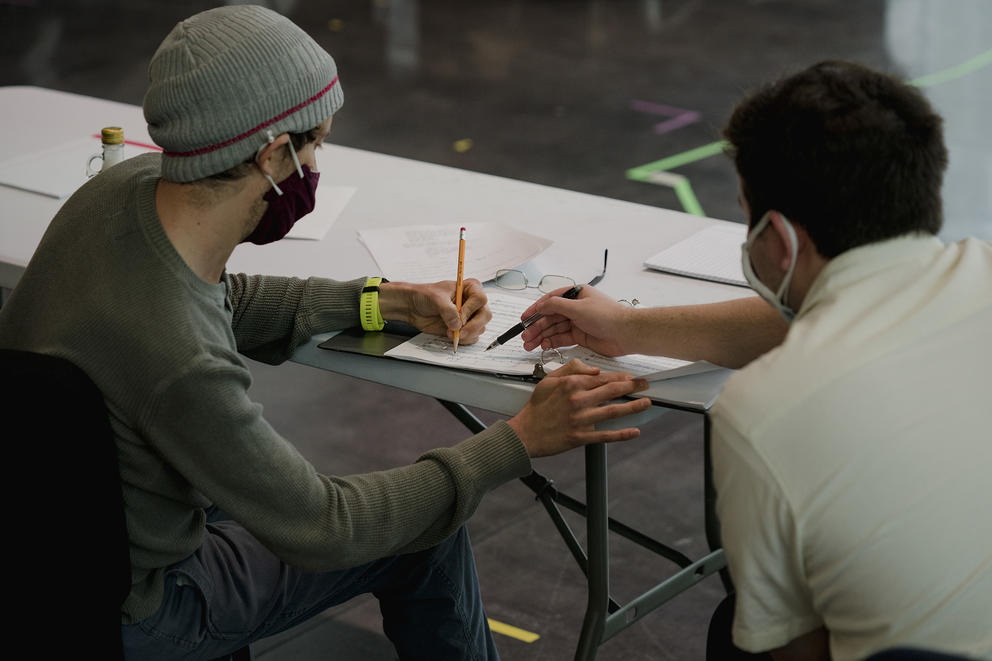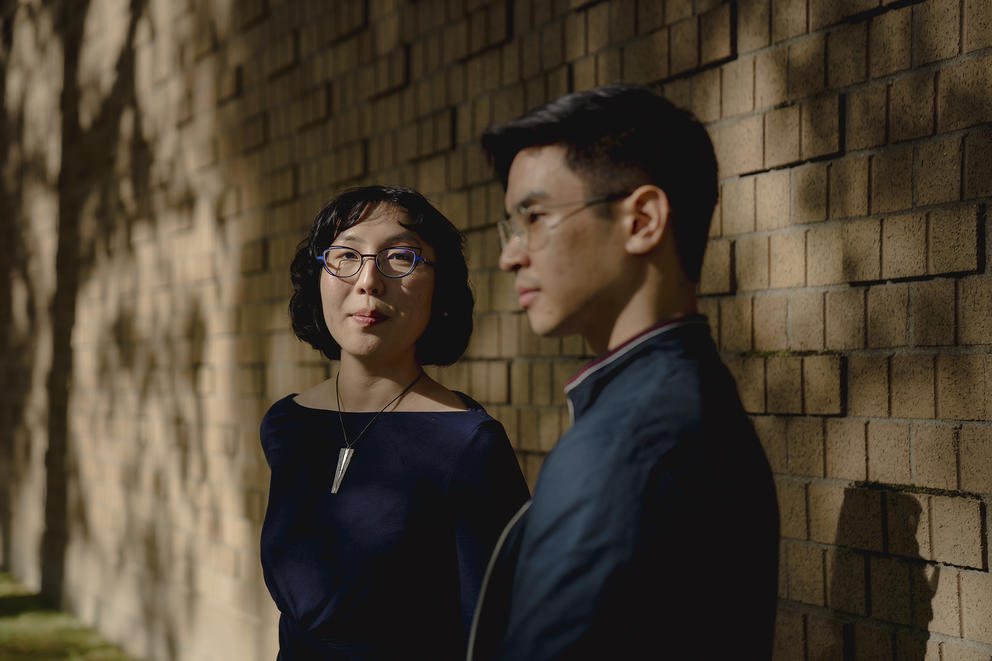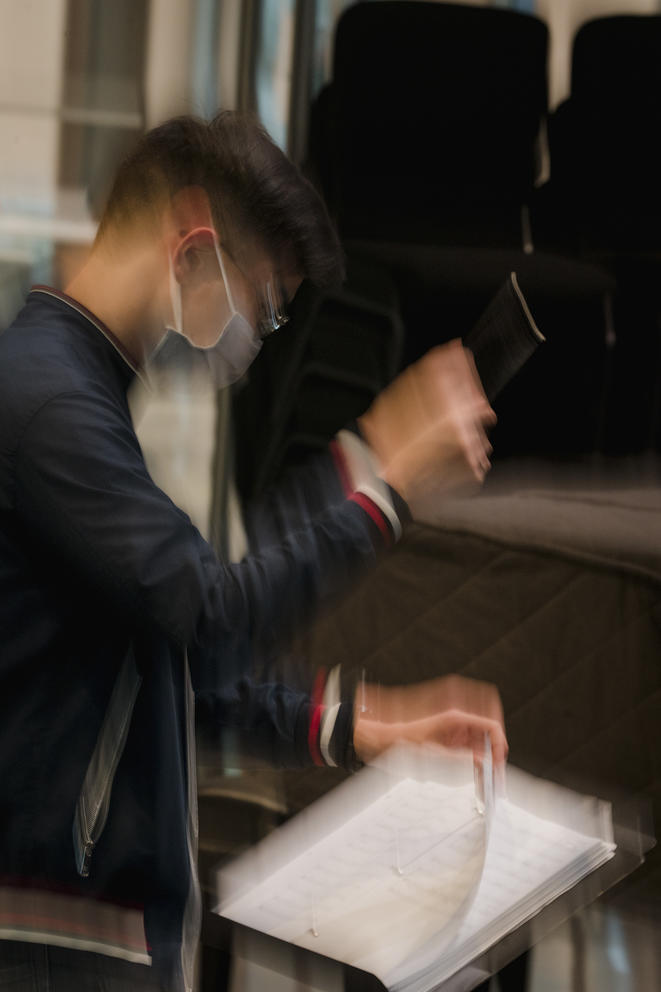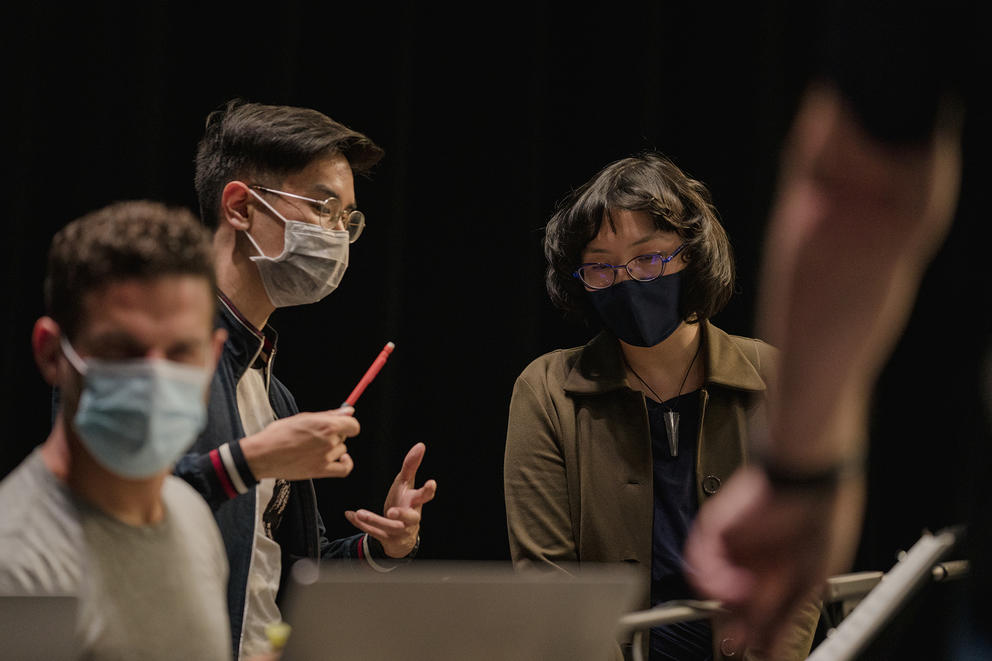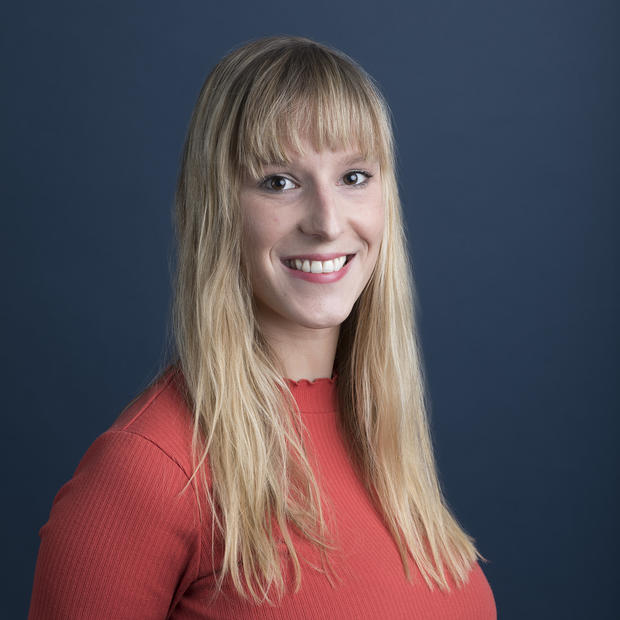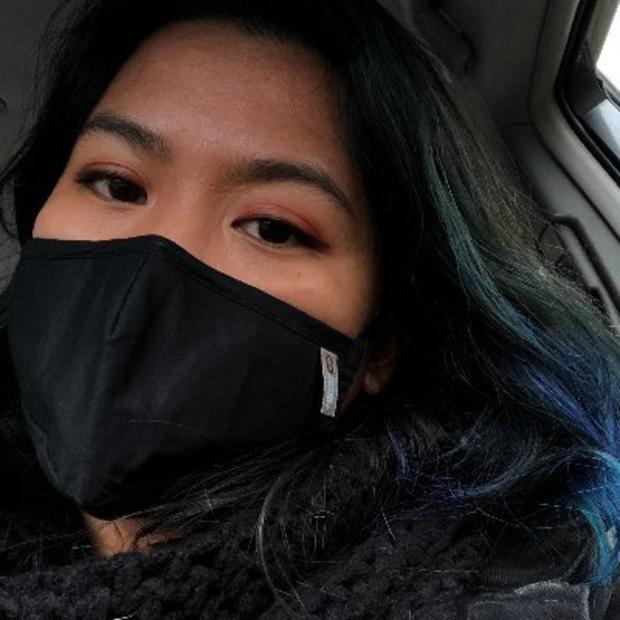It’s not a conversation commonly heard during an opera rehearsal. But few operas are written about bulimia — especially with the candor and dark humor of Seattle-based performer/writer/comedian Julia Sonya Koyfman.
On this sultry spring day in early May, Koyfman is sitting behind a folding table in the bright, window-walled Tagney Jones Hall with composer Paul Stovall, her collaborator and friend. This workshop with soprano Ellaina Lewis marks the first time Koyfman and Stovall are hearing someone sing Flush, the opera they’ve written over the past six months.
Be ashamed of your breakfast, or you won’t make the cast list, Lewis crescendoes, as cars zoom by on busy Mercer Street outside. Cut out carbs — calories.
Koyfman and Stovall (both in their early 20s) are here as part of the Seattle Opera’s Creation Lab, a newly launched program that aims to foster the next generation of opera makers by pairing Washington state-based, 16- to 30-year old writers and composers with mentors to stage brand new short operas with a professional cast.
Created over the course of 21 weeks — via Zoom and during socially distanced, masked rehearsal sessions — this year’s eight Creation Lab operas will be streamed on the Seattle Opera website, in two separate bills, starting Sept. 9 and Sept. 10.
The inaugural cohort’s 20-minute creations use traditional opera vocals to deal with raw issues in fresh ways or take innovative approaches to storylines and orchestration. The dramatic opera Blaze depicts the personal losses caused by terrifying wildfires. If only I could give you the sun, a nonbinary/transgender retelling of the Icarus myth, centers generosity and joy instead of hubris and calamity. The existential opera Stars Between tells the story of the Voyager space mission with the help of ’80s synths and a vocoder (along with some Ariana Grande inspiration). And in Flush, the soprano portrays a girl running into a public bathroom — and the mezzo-soprano plays the toilet who sings back to her.
“It’s about the struggle of bulimia and the really dark place that it sends you to — and also kind of comedic parts of it, because there is something inherently funny about someone being a toilet,” Koyfman explains to the two singers involved in the May rehearsal. “The best way you can help educate, bringing attention to it, is by letting people in to laugh and then actually having them see what it’s like for someone who struggles with it.”
Koyfman, who has lived with bulimia for years and is currently in recovery, knows that eating disorders have the highest death rates among mental illnesses. She also knows that many musicians (including opera singers) struggle with eating disorders behind the scenes — yet opera doesn’t have the best track record when it comes to depicting mental health and suicide. (A recent study of 400 centuries of the art form found that about a third of the major operas included scenes of suicide or suicidal thoughts.)
“Opera has this history of, not [quite] glamorizing suicide, but that’s how a lot of operas end,” Koyfman told me in a recent Zoom interview. “We literally just watch our protagonist jump out a window. And the music is beautiful — it’s not a great message.”
Koyfman never expected she would get to craft a different message for the opera stage, until Stovall reached out to her with his proposal to apply to Creation Lab together. As a kid, she’d listen to her great-grandmother — a concert violinist who immigrated from Ukraine — play classical music, but opera always felt out of reach. “It felt like this elitist thing that I wasn't allowed to be a part of, even though I wanted to be…. I loved it, but I was terrified of it.”
That’s, in part, why Creation Lab is open to all kinds of artists, rather than those already on track for an opera career. The program’s request for proposals was crafted explicitly to attract playwrights, novelists, poets and music writers of all genres.
“That was to bring in a new crop of artists who maybe hadn’t seen themselves as artists who could work in opera,” says Alejandra Valarino Boyer, the Seattle Opera’s director of programs and partnerships, “and also to push along our own art form — to see: ‘Where can opera evolve to?’ ‘What can it be?’ ”
The western opera is a more than 400-year-old art form (China and multiple Southeast Asian countries have opera traditions dating back many more centuries) that originated in Renaissance Italy. Although new operas continue to be created — including by the Talking Heads’ David Byrne — most big opera houses focus on the genre’s greatest hits: century-old works performed in Italian, German, French or Russian, like La Bohème (on stage at Seattle Opera starting Oct. 16), Tosca, The Magic Flute or Tristan und Isolde.
For the Seattle Opera and other opera houses, these “classics” generally still draw the biggest crowds. But, says Christina Scheppelmann, general director of the Seattle Opera, “The stories that people are drawn to tend to be ones with a protagonist who allows you to feel.”
She notes that the Seattle Opera, in recent years, has staged many newer, 20th or 21st century works like the jazz-infused Charlie Parker’s Yardbird (2015) and The (R)evolution of Steve Jobs (2017). The opera is also working on a coproduction about the life of Malcolm X and is gearing up to present the world premiere of A Thousand Splendid Suns (based on the novel by Khaled Hosseini). And Blue, which will premiere in early 2022, Scheppelmann points out, won the Music Critics Association of North America’s Best New Opera award last year.
“We really believe that in order to move the canon forward, in order to diversify our repertoire, there has to be new music created, new stories told,” Valarino Boyer says. That’s why the Creation Lab exists. “This program gives an opportunity for young creators to be telling stories that are relevant to them, that are relevant to their time — not stories that are relevant to the past.”
Creation Lab participants Brian Dang and Drew Swatosh did both: In If Only I Could Give You the Sun, they honor opera’s roots as a vehicle for the retelling of Greek myths. At the same time, they make the story deeply relevant to them, by recasting the myth of Icarus and Daedalus (in which Icarus escapes the Labyrinth thanks to his father’s wings, but flies too close to the sun) through the lens of Icarus’ being a nonbinary character who has to navigate a maze of societal pressures. Daedalus shifts into the role of friend, parent and lover supporting Icarus on the journey.
“It kind of plays on the opera trope of writing about a Greek myth,” says Swatosh, who wrote the score. “Most often, you might hear a retelling of the myth of Orpheus, but I hadn't really heard of anyone redoing the myth of Icarus and Daedalus.”
The main difference in this version: a happy ending. “The retelling of the myth of Icarus and Daedalus was particularly exciting to us because it is one that most people hear and know ends in tragedy: Icarus falls into the sea and dies,” says librettist Dang, a local playwright and poet. “We were interested in writing a story that culminates in something joyous. Icarus does reclaim that joy of being human and being in a body that they have control and agency over.”
Also quite rare in the often-archaic world of opera and its gender-stereotypical casting: Swatosh wrote the role of Icarus to be performed by a transgender singer, regardless of their birth-assigned gender. “We were actually able to have a transgender singer singing the role, and that just added an extra layer of depth because of the way she was able to resonate with the work,” Swatosh says.
Singer Katherine Goforth, center, speaks with librettist Brian Dang, right, and composer Drew Swatosh, left, during rehearsal for the opera “If Only I Could Give You the Sun,” created by Dang and Swatosh for Seattle Opera's 2021 Jane Lang Davis Creation Lab, on Wednesday, June 23, 2021, in Seattle, Wash.
During a recent rehearsal, Icarus, played by Katherine Goforth, was singing her way through the story’s maze of dysphoria. Later, Swatosh will meld her voice, the keyboard, marimba, a clarinet and strings with a prerecorded electronic soundtrack to enhance the disorientation. I am your friend who says: you will find your way, or we will both crumble, Daedalus calls out. If only I could give you the sun this very instant.
Later, Icarus decides to fly to the sun, but this time no perilous death awaits. I will fall into joy, Goforth sings in rehearsal at the Seattle Opera, while the creators and their mentors look on. I will fall into life and this gift of being alive on Earth in my very own body — she takes an audible breath, per the score — is miiiiiiine.
A few weeks later is the second round of rehearsals, this time with a small group of instrumentalists. Stars Between gets underway, with the string trio kicking things off softly at first — until an unsettling, low bass interrupts. In the second scene, a slow beat with a hi hat cymbal slinks in, providing a 1980s suave sensation. The mentors and assembled opera crew bop their heads to the synths.
“It’s a slow jam,” jokes Steven Tran, the composer of the piece.
When the tenor is joined by an electropop beat during a moving aria, Tran does a few dance moves from behind his music stand.
A local musical theater talent and music producer, Tran knew he wanted to incorporate electronic music as soon as he read the story proposal by E. Lily Yu, a local writer (author of the magical realist On Fragile Waves). He also added a heavy dose of pop and hints of trap music, he says.
Fly-by in T minus — JPL to Voyager One. Find us planetary secrets, the keyboardist (aka Mission Control) says through his mic, his voice turned robotic thanks to a vocoder.
Calling Stars Between a sci-fi opera would only be half-correct. Much of the subject matter is true (outside the two interstellar robotic probes singing and talking to each other). In 1977, NASA sent two Voyager probes into space for a data collection mission, visiting all four outer planets of the solar system, and they’re still out there.
“The Voyager mission has lasted decades beyond its expected end date — the probes are expected to run out of fuel by 2025,” says Yu, who wrote the libretto.
That in itself was a compelling storyline, but the fact that each of the probes carries a “Golden Record” — a phonograph with images and music from around the world, meant for extraterrestrial listeners — added another layer. “The idea of being sent out into the darkness, carrying great beauty and carrying the best of what humanity is” proved endlessly fascinating, she says.
Though there may be no dearth of space operas in science fiction, few operas deal with space travel beyond aliens and rocket ships. Karel Janovický’s 1958 one-act opera The Utmost Sail — about the launch of the Sputnik satellite — is the exception. What sets The Stars Between apart is that here, the space probes are sentient beings, far enough removed from Earth and just humanlike enough to reflect on the grand voyage that is life.
As their so-called Grand Tour jettisons the Voyagers past space debris, “dusky golden Saturn storms” and the “turquoise bauble” of Uranus, the two probes turn existential: No one chooses to be made, to live a while and decay, Voyager 2 sings. But we were made, and we were called, and now we serve our purposes: To see the beautiful unseen. To know new things and tell them true.
Just like the Voyager probes, Yu’s and Tran’s joint mission may last beyond its intended end date (the opera’s Sept. 10 release). Just a few months ago, they were strangers paired by the Creation Lab team on the basis of their applications (as was the case with most libretto-composer duos in the program). But much as with Dang and Swatosh, their collaboration has been so positive they want to keep it going, possibly for a full-length version of Stars Between.
“Steven, and our collaboration — that was probably the best thing that came out of this process for me,” Yu responds when I ask if there’s something specific she’ll take away from the project.
I prod, and ask her again. Anything else? “Asking me that question is a little bit like asking somebody what they learned from their first experience of flight,” Yu says. “It’s not so much an educational experience as it is suddenly having the freedom and the possibility to do beautiful things you’ve never been able to do before.”
Get the latest in local arts and culture
This weekly newsletter brings arts news and cultural events straight to your inbox.


